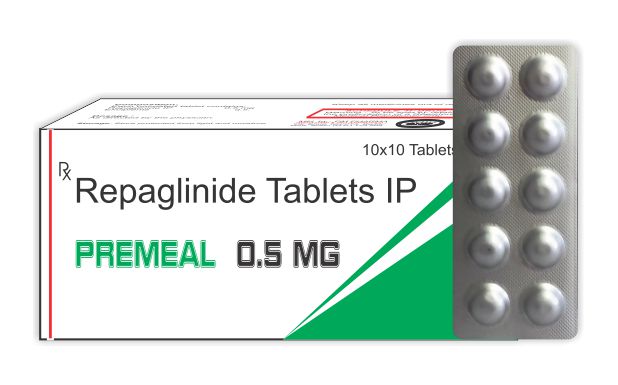Type-2 diabetes is a disease in which your pancreas does not make enough insulin to control the sugar in your blood or where your body does not respond normally to the insulin it produces.
Repaglinide is used to control type 2 diabetes in adults as an add-on to diet and exercise: treatment is usually started if diet, exercise and weight reduction alone have not been able to control (or lower) your blood sugar. Repaglinide can also be given with metformin, another medicine for diabetes.
Repaglinide has been shown to lower the blood sugar, which helps to prevent complications from your diabetes.
Therapeutic Indication:
Repaglinide is indicated in adults with type-2 diabetes mellitus whose hyperglycaemia can no longer be controlled satisfactorily by diet, weight reduction and exercise.
Uses:
Repaglinide is used alone or with other medications to control high blood sugar along with a proper diet and exercise program. It is used in people with
- Type 2 diabetes
- Helps prevent kidney damage, blindness, nerve problems, loss of limbs, and sexual function problems
- Stimulating the body to produce more insulin
Pharmacology:
Pharmacodynamic Poperties:
Mechanism of Action:
Repaglinide is a short-acting oral secretagogue. It lowers the blood glucose levels acutely by stimulating the release of insulin from the pancreas, an effect dependent upon functioning β-cells in the pancreatic islets.
Repaglinide closes ATP-dependent potassium channels in the β-cell membrane via a target protein different from other secretagogues. This depolarises the β-cell and leads to an opening of the calcium channels. The resulting increased calcium influx induces insulin secretion from the β-cell.
Pharmacodynamic Effects:
In type-2 diabetic patients, the insulinotropic response to a meal occurred within 30 minutes after an oral dose of repaglinide. This resulted in a blood glucose-lowering effect throughout the meal period. The elevated insulin levels did not persist beyond the time of the meal challenge. Plasma repaglinide levels decreased rapidly, and low concentrations were seen in the plasma of type-2 diabetic patients 4 hours post-administration.
Pharmacokinetics:
Absorption: Repaglinide is rapidly absorbed from the gastrointestinal tract, which leads to a rapid increase in the plasma concentration of the active substance. The peak plasma level occurs within one hour post administration. After reaching a maximum, the plasma level decreases rapidly.
Repaglinide pharmacokinetics are characterised by a mean absolute bioavailability of 63% (CV 11%). No clinically relevant differences were seen in the pharmacokinetics of repaglinide, when repaglinide was administered 0, 15 or 30 minutes before a meal or in fasting state.
A high inter-individual variability (60%) in repaglinide plasma concentrations has been detected in the clinical trials. Intra-individual variability is low to moderate (35%) and as repaglinide should be titrated against the clinical response, efficacy is not affected by inter-individual variability.
Distribution: Repaglinide pharmacokinetics are characterised by low volume of distribution, 30 L (consistent with distribution into intracellular fluid) and is highly bound to plasma proteins in humans (greater than 98%).
Metabolism: Repaglinide is almost completely metabolised, and no metabolites with clinically relevant hypoglycaemic effect have been identified.
Elimination: Repaglinide is eliminated rapidly within 4 - 6 hours from the blood. The plasma elimination half-life is approximately one hour.
Repaglinide metabolites are excreted primarily via the bile. A small fraction (less than 8%) of the administered dose appears in the urine, primarily as metabolites. Less than 1% of repaglinide is recovered in faeces.
Contraindications:
- Hypersensitivity to repaglinide
- Diabetes mellitus type-1, C-peptide negative
- Diabetic ketoacidosis, with or without coma
- Severe hepatic function disorder
- Concomitant use of Gemfibrozil
Pregnancy and Lactation:
If you are pregnant or breast-feeding or think you may be pregnant or are planning to have a baby, ask your doctor for advice before taking this medicine.
Warning & Precaution:
Talk to your doctor before taking Repaglinide
- If you have liver problems: Repaglinide is not recommended in patients with moderate liver disease. It should not be taken if you have a severe liver disease.
- If you have kidney problems: Repaglinide should be taken with caution.
- If you are about to have major surgery or you have recently suffered a severe illness or infection:At such times diabetic control may be lost.
- If you are under 18 or over 75 years of age: Repaglinide is not recommended. It has not been studied in these age groups.
Adverse Drug Reactions:
Hypoglycemia, Allergy, Diarrhea, Stomach Pain, constipation, vomiting, visual disorders.
Driving and using machines:
Your ability to drive or use a machine may be affected if your blood sugar is low or high. Bear in mind that you could endanger yourself or others. Please ask your doctor whether you can drive a car if you:
- Have few or no warning signs of hypos
- Have frequent hypos
Storage:
Store protected from light and moisture.
